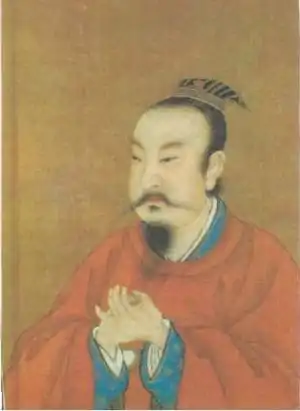779
Year 779 (DCCLXXIX) was a common year starting on Friday of the Julian calendar. The denomination 779 for this year has been used since the early medieval period, when the Anno Domini calendar era became the prevalent method in Europe for naming years.
| Millennium: | 1st millennium |
|---|---|
| Centuries: | |
| Decades: | |
| Years: |
| 779 by topic |
|---|
| Leaders |
|
| Categories |
|
| Gregorian calendar | 779 DCCLXXIX |
| Ab urbe condita | 1532 |
| Armenian calendar | 228 ԹՎ ՄԻԸ |
| Assyrian calendar | 5529 |
| Balinese saka calendar | 700–701 |
| Bengali calendar | 186 |
| Berber calendar | 1729 |
| Buddhist calendar | 1323 |
| Burmese calendar | 141 |
| Byzantine calendar | 6287–6288 |
| Chinese calendar | 戊午年 (Earth Horse) 3475 or 3415 — to — 己未年 (Earth Goat) 3476 or 3416 |
| Coptic calendar | 495–496 |
| Discordian calendar | 1945 |
| Ethiopian calendar | 771–772 |
| Hebrew calendar | 4539–4540 |
| Hindu calendars | |
| - Vikram Samvat | 835–836 |
| - Shaka Samvat | 700–701 |
| - Kali Yuga | 3879–3880 |
| Holocene calendar | 10779 |
| Iranian calendar | 157–158 |
| Islamic calendar | 162–163 |
| Japanese calendar | Hōki 10 (宝亀10年) |
| Javanese calendar | 674–675 |
| Julian calendar | 779 DCCLXXIX |
| Korean calendar | 3112 |
| Minguo calendar | 1133 before ROC 民前1133年 |
| Nanakshahi calendar | −689 |
| Seleucid era | 1090/1091 AG |
| Thai solar calendar | 1321–1322 |
| Tibetan calendar | 阳土马年 (male Earth-Horse) 905 or 524 or −248 — to — 阴土羊年 (female Earth-Goat) 906 or 525 or −247 |

Emperor De Zong (Li Kuo) (742–805)
Events
Europe
- Saxon Wars: King Charlemagne assembles a Frankish army at Düren, crosses the Rhine at the modern town of Wesel, and defeats the Saxons in battle near Bocholt (North Rhine-Westphalia). All the main Westphalian leaders are captured, except Widukind. Charlemagne crosses the Weser, Oker and Ohre rivers into Eastphalian territory, where local leaders submit to Frankish rule and hand over hostages. Widukind remains in northern Saxony, and relies on guerrilla warfare.[1]
Britain
- Battle of Bensington: King Offa of Mercia defeats his rival Cynewulf of Wessex at Bensington (modern-day Oxfordshire). He seizes control of Berkshire, and probably London as well. According to sources of the Anglo-Saxon Chronicle Offa becomes "King of All England". Charlemagne writes a letter to him as "his dearest brother", but when Offa refuses to let one of Charlemagne's sons marry one of his daughters, Charlemagne threatens to close the ports to English traders.
Asia
- June 12 - In China, De Zong (personal name Li Kuo) succeeds his father Dai Zong, as emperor of the Tang Dynasty.
Births
- Agobard, archbishop of Lyon (approximate date)
- Ibrahim ibn al-Mahdi, Muslim prince (d. 839)
- Jia Dao, Chinese poet and Buddhist monk (d. 843)
- Yuan Zhen, politician of the Tang Dynasty (d. 831)
Deaths
- June 10 – Dai Zong, emperor of the Tang Dynasty (b. 727)
- December 17 – Sturm, abbot of Fulda
- Æthelred I, king of East Anglia (approximate date)
- Fujiwara no Momokawa, Japanese statesman (b. 732)
- Gerard I, Frankish count
- Walpurga, Anglo-Saxon abbess (or 777)
References
- David Nicolle (2014). The Conquest of Saxony AD 782–785, p. 17. ISBN 978-1-78200-825-5.
This article is issued from Wikipedia. The text is licensed under Creative Commons - Attribution - Sharealike. Additional terms may apply for the media files.